|
|
|
Sort Order |
|
|
|
Items / Page
|
|
|
|
|
|
|
| Srl | Item |
| 1 |
ID:
128405
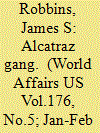

|
|
|
|
|
| Publication |
2014.
|
| Summary/Abstract |
Picture yourself locked "in a dimly lit, windowless concrete box, approximately nine feet long by four feet wide," with a bamboo mat and a bucket, one or both of your ankles locked in irons, left there like a caged animal. Now imagine spending two years there, alone-the isolation interrupted only by routine interrogation and occasional torture sessions, some lasting days-and you are getting close to describing the experiences of a handful of American prisoners of war whose North Vietnamese hosts had designated them as troublemakers. These were the men of Alcatraz. In all, more than three hundred and fifty American servicemen were being held captive by North Vietnam when US involvement ended in 1973. Few tales of American valor are as dramatic and gut-wrenching as those of the Vietnam-era POWs, some of whom were held for eight years, twice the length of US involvement in the Second World War. Defiant, by Alvin Townley, whose previous book chronicled the world of US Navy aviation, is the story of eleven of these captives whose leadership and resistance to their captors' treatment, including efforts to use them for propaganda purposes, caused the North Vietnamese so much trouble they were rounded up, blindfolded, and removed to a special prison they dubbed Alcatraz. They would spend two years there, isolated from the main group of American prisoners, segregated even from one another, forbidden to communicate amongst themselves, and tortured repeatedly for their refusal to capitulate. According to a camp functionary they nicknamed "Rabbit," the Alcatraz Eleven were the "darkest criminals who persist in inciting the other criminals to oppose the Camp Authority." We would call them heroes.
|
|
|
|
|
|
|
|
|
|
|
|
|
|
|
|
| 2 |
ID:
056917
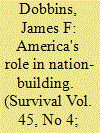

|
|
|
|
|
| Publication |
2003.
|
| Description |
p87-109
|
|
|
|
|
|
|
|
|
|
|
|
|
|
|
|
| 3 |
ID:
075658
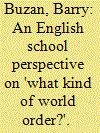

|
|
|
| 4 |
ID:
105691
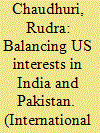

|
|
|
|
|
| Publication |
2011.
|
| Summary/Abstract |
Convincing the Pakistani military to focus its attention on the Afghan Taliban and associated groups has so far proved unsuccessful. The Obama administration's reliance on economic incentives and regional peace initiatives, such as a dialogue with India on Kashmir, has failed to deliver tangible results. Instead, India's footprint within Afghanistan has expanded, leaving Pakistani elites ever more anxious. Balancing Indian and Pakistani interests in South Asia remains a top priority for Western governments, and most importantly the US. In the current milieu this will require shifting Western bureaucratic focus from the age old and seemingly intractable Kashmir dispute to maintaining the peace within Afghanistan. This article outlines why this shift should be considered, and how the India--Pakistan trust deficit might be bridged.
|
|
|
|
|
|
|
|
|
|
|
|
|
|
|
|
| 5 |
ID:
130702
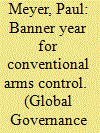

|
|
|
|
|
| Publication |
2014.
|
| Summary/Abstract |
THE CONTROL OF CONVENTIONAL ARMS HAS OFTEN SEEMED THE POOR COUSIN of the global efforts to control weapons of mass destruction (WMD). Since the advent of the atomic era, the focus of arms control and disarmament activity has been overwhelmingly on nuclear weapons and their lesser, if still ugly, stepsisters of biological and chemical weapons. The initial multilateral arms control agreements concerned themselves with limits on the testing of nuclear weapons and, shortly thereafter, with their nonproliferation (e.g., the Nuclear Nonproliferation Treaty of 1968). Bilateral US-Soviet/Russian arms control arrangements also predominantly dealt with the reduction of strategic nuclear forces and restraints on deployments of defenses against (nuclear tipped) ballistic missiles. Efforts to reduce major conventional weapon systems were also taken up in the 1980s in the context of negotiations
between the opposing alliances of NATO and the Warsaw Pact, eventually culminating in the Treaty on Conventional Forces in Europe (CFE Treaty) of 1989. This treaty provided for a massive reduction in the conventional forces that had confronted each other for years in Central Europe and established a new, far more stable security order on the continent. Even the CFE Treaty, however, tended to be overshadowed by other major disarmament agreements concluded in those heady post-Cold War days: the Intermediate Nuclear Forces Treaty (1987), Chemical Weapons Convention (1993), Comprehensive (Nuclear) Test Ban Treaty (1996), and various US-Russian bilateral strategic nuclear arms accords of the 1990s and early 2000s (e.g., the Strategic Arms Reduction Treaty and the Strategic Offensive Reductions Treaty).
|
|
|
|
|
|
|
|
|
|
|
|
|
|
|
|
| 6 |
ID:
022129
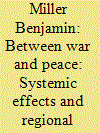

|
|
|
|
|
| Publication |
Autumn 2001.
|
| Description |
1-52
|
|
|
|
|
|
|
|
|
|
|
|
|
|
|
|
| 7 |
ID:
131417
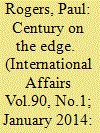

|
|
|
|
|
| Publication |
2014.
|
| Summary/Abstract |
The article argues that the century from 1945 is likely to prove seminal in terms of human progress. It marks the period when the human community has to come to terms with its capacity for self-destruction through the invention of weapons of mass destruction and its ability to exceed the homeostatic capabilities of the global ecosystem in an era of deep socio-economic divisions. Two-thirds of the way through this century the progress has been mixed. Nuclear war has been avoided more by luck than by wisdom, there remain risks of nuclear proliferation and it is not evident that humankind has acquired the ability to deal with the destructive potential of bio-, nano- and other emerging technologies. Recognition of the extent of anthropogenic impacts on ecosystem stability is evident, but not at the level necessary for the radical responses required. Even so, there are signs of progress and potential for change, suggesting that the final one-third of the century will be singularly important in ensuring long-term emancipation and environmental sustainability.
|
|
|
|
|
|
|
|
|
|
|
|
|
|
|
|
| 8 |
ID:
178924
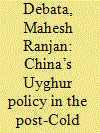

|
|
|
| 9 |
ID:
064236
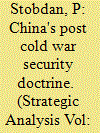

|
|
|
| 10 |
ID:
084465
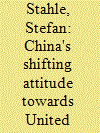

|
|
|
|
|
| Publication |
2008.
|
| Summary/Abstract |
While China has been portrayed as a reluctant supporter of UN peacekeeping in the past, it has voted in favour of every newly established UN peacekeeping operation since the beginning of the new millennium. Previous studies of China's behaviour in UN peacekeeping explained this phenomenon primarily with recent shifts in its foreign and security policy rather than with changes in UN peacekeeping itself. This article analyses China's voting behaviour in the UN Security Council on peacekeeping resolutions in the context of the evolving concepts of UN peacekeeping. It argues that China's recent enthusiasm for these missions is the result of two developments. On the one hand, Beijing was able to reinterpret its understanding of UN peacekeeping after its experience in the 1990s, especially with regard to the use of force; while on the other hand, the way UN peacekeeping missions are conducted was reformed after the Brahimi Report in 2000, which made UN peacekeeping more agreeable to the China.
|
|
|
|
|
|
|
|
|
|
|
|
|
|
|
|
| 11 |
ID:
131790
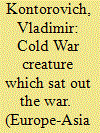

|
|
|
|
|
| Publication |
2014.
|
| Summary/Abstract |
A substantial body of literature argues that government funding motivated by the Cold War shaped (or distorted) the content of the American academic disciplines. This article tests the impact of such funding on the academic study of the Soviet economy, a small field created to help fight the Cold War. It documents the amount of attention given by researchers to the military sector of the Soviet economy, the topic of central importance for the Cold War, and finds that their publications largely ignored it. Considerations other than the interests of the sponsors determined the choice of topics in the discipline.
|
|
|
|
|
|
|
|
|
|
|
|
|
|
|
|
| 12 |
ID:
085088
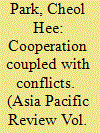

|
|
|
|
|
| Publication |
2008.
|
| Summary/Abstract |
This article addresses a profoundly curious question of why Korea and Japan conflict with each other despite deepening ties and growing transactions. In contrast to the existing explanations, this article makes three analytical innovations. First, for inducing cooperation between Korea and Japan, what matters is convergence/divergence of external threat perception, not the magnitude of threat. Second, history is not a constant but a variable. Historical contentions can be escalated or deescalated depending on political situations. Third, the role of the US in managing Korea-Japan relations is important but not determinant. The style of US engagement in East Asia serves as an intervening variable for conflict management. This article suggests that frictions are highest when historical contentions are escalated and external threat perception diverges. On the other hand, cooperation potential is highest when historical contentions are deescalated and threat perception converges.
|
|
|
|
|
|
|
|
|
|
|
|
|
|
|
|
| 13 |
ID:
085552
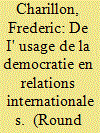

|
|
|
|
|
| Publication |
2008.
|
| Summary/Abstract |
The paper reflects on the end of the post-Cold War triumphalism that had swept the West and also on the belief that democracy could be a cure all solution to the problems of developing and other countries in the new international system. It argues that these were clearly illusions but also that democracy has its place in all cultures, but in a form that is sensitive to local needs and cultures. It points to the dangers of believing that democracy can always be used, internally or externally, in a constructive manner and argues that French thinkers like Bertrand Badie are right to warn us of the dangers of casually importing Western ideas of the state into developing countries in particular.
|
|
|
|
|
|
|
|
|
|
|
|
|
|
|
|
| 14 |
ID:
096016
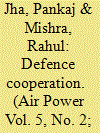

|
|
|
| 15 |
ID:
017677
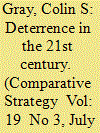

|
|
|
|
|
| Publication |
2000.
|
| Description |
255-262
|
|
|
|
|
|
|
|
|
|
|
|
|
|
|
|
| 16 |
ID:
124175
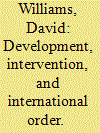

|
|
|
|
|
| Publication |
2013.
|
| Summary/Abstract |
The project of international development involves the reordering of states (or at least attempts to do so), it sits at the intersection between transnational forces and bounded political entities and it is a manifestation of the will to order of powerful states. It would seem then to be closely connected to practices of intervention. At times, the practices of development agencies have taken on a more interventionist character, but in recent years their relationship to many developing countries has taken on a more intricate, subtle, and everyday form. It has in important respects moved 'beyond' intervention. This has significance beyond international development. Development agencies have been recruited to wider projects of international ordering, especially the construction of regimes of global governance and the 'development' of post-intervention states.
|
|
|
|
|
|
|
|
|
|
|
|
|
|
|
|
| 17 |
ID:
121403
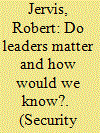

|
|
|
|
|
| Publication |
2013.
|
| Summary/Abstract |
This paper will explore the ambivalence or conflict in the literature about the extent to which leaders matter in international politics, commonly linked to the level-of-analysis question. One the one hand, national leaders are often larger than life figures with strong preferences and distinctive personalities who seem to leave their stamp on events. On the other hand, most ir scholars place great stress on the incentives and constraints posed by the environment, be it domestic or international. I will proceed in four sections. The first discusses the essential claims at stake, the kinds of evidence that could be adduced to support one position or the other, and the pathways by which individual differences can make themselves felt. The second section examines the implications for morality, responsibility, and democratic theory. This discussion too will point to relevant methods, including ones that are contested. I will then turn to post-Cold War American foreign policy, skeptically examine the claim that individual presidents, even George W. Bush, mattered as much as is generally believed and close by discussing the implications for democratic accountability and control.
|
|
|
|
|
|
|
|
|
|
|
|
|
|
|
|
| 18 |
ID:
004482
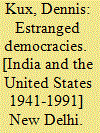

|
|
|
|
|
| Publication |
New Delhi, Sage Publications, 1993.
|
| Description |
xxiv, 514p.
|
| Standard Number |
0803991606
|
|
|
|
|
|
|
|
|
|
|
|
Copies: C:4/I:0,R:0,Q:0
Circulation
| Accession# | Call# | Current Location | Status | Policy | Location |
| 035192 | 327.54073/KUX 035192 | Main | On Shelf | General | |
| 035241 | 327.54073/KUX 035241 | Main | On Shelf | General | |
| 037373 | 327.54073/KUX 037373 | Main | Withdrawn | General | |
| D35192 | 327.54073/KUX D35192 | Main | On Shelf | General | |
|
|
|
|
| 19 |
ID:
121432
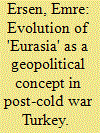

|
|
|
|
|
| Publication |
2013.
|
| Summary/Abstract |
This article aims to discuss and analyse the major factors behind the emergence and evolution of "Eurasia" as a geopolitical concept in Turkey in the post-Cold War period. For this purpose, special focus will be placed on Turkish political, academic and intellectual circles' redefinition of their geopolitical outlook towards Russia and the Turkic republics of Central Asia and Caucasus in the 1990s and 2000s. The major argument of the article in this regard is that while discourses such as Pan-Turkism, Eurasianism and Neo-Ottomanism have exercised a degree of influence over the conceptualisation of Eurasia in Turkish academic and intellectual circles, the concept has been generally treated as an instrument of pragmatism by Turkish policymakers. This pragmatism is not only reflected in their geo-economic calculations in the field of energy pipelines, but also the reasoning behind the striking improvement of political and economic relations between Turkey and Russia in the 2000s.
|
|
|
|
|
|
|
|
|
|
|
|
|
|
|
|
| 20 |
ID:
023502
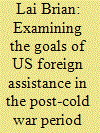

|
|
|
|
|
| Publication |
Jan 2003.
|
| Description |
103-128
|
|
|
|
|
|
|
|
|
|
|
|
|
|
|
|
|
|
|
|
|